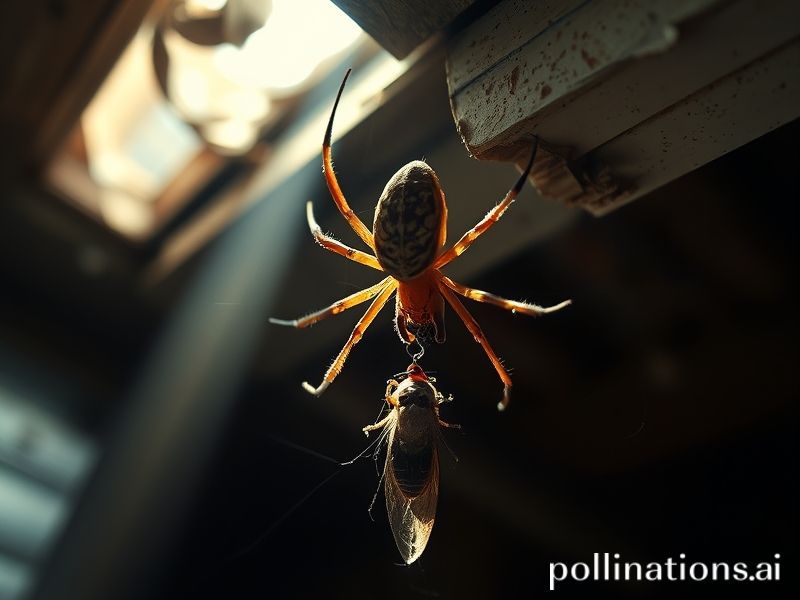Global Web of Power: How House Spiders Outrank Nations in the Borderless Real Estate Market
House Spiders: The Eight-Legged Diplomats Quietly Outmaneuvering Humanity in Every Hemisphere
By the time you finish this sentence, approximately 3,800 house spiders will have successfully negotiated new rent-free leases in human dwellings from Lagos to Ljubljana. While we obsess over trade wars, carbon credits, and whose algorithmic overlord has the shiniest new update, the true global superpower is busy spinning silk in the corner above your headboard—utterly unbothered by passports, sanctions, or your frantic Google search “how to evict spider without looking like coward.”
Let’s start with the obvious: the term “house spider” is charmingly anthropocentric, like calling the Pacific “our backyard pond.” In reality, Tegenaria domestica and its cosmopolitan cousins have territorial claims that make the British Empire at its peak look quaint. From the shotgun shacks of New Orleans to the capsule hotels of Tokyo, their embassies operate 24/7, no visas required. Climate change? That’s just gentrification by another name, opening up fresh Arctic lofts for the heat-loving Steatoda nobilis. Brexit? A minor customs delay for arachnid silk imports. The spiders, frankly, have bigger webs to weave.
Consider the economics. The global pest-control industry—essentially a futile, biped-led counter-insurgency—clocks in at roughly $19 billion annually. That’s more than Iceland’s GDP and still can’t stop a creature whose entire brain is the size of a poppy seed but whose compound eyes can detect the vibration of a fruit fly hiccupping in the next room. Meanwhile, each spider quietly performs an estimated $1.2 million in free insect-control services per hectare. In layman’s terms: they’re the unpaid interns of the biosphere, except they actually know what they’re doing and never ask for a LinkedIn recommendation.
Culturally, reactions range from zen acceptance in Kyoto (where a spider descending from the ceiling is read as an omen of good guests arriving—possibly because said guest is already wrapped in silk on the tatami) to full-blown ballistic panic in suburban Sydney, where every crawling dot triggers a mandatory evacuation protocol and a Facebook Live stream titled “KILL IT WITH FIRE.” The UN, ever eager to draft treaties nobody will read, has yet to issue a statement on arachnid rights. One suspects the spiders don’t mind; multilateralism is dreadfully slow when you’re accustomed to pouncing on prey at 0.04 seconds.
Then there’s the soft-power question. China’s Belt and Road Initiative may pour concrete from Mombasa to Milan, but Pholcus phalangioides has already installed gossamer fiber-optic cables in every portico along the way. Russia weaponizes energy supplies; spiders weaponize subconscious dread. A single daddy long-legs dangling over a European Commission meeting can derail agricultural policy faster than any lobbyist. Meanwhile, Silicon Valley promises neural implants and metaverse immortality; spiders achieved distributed cognition millennia ago via vibration-sensing leg hairs and still don’t need firmware updates. Talk about agile development.
Of course, humans console themselves with folklore. The Lakota see Spider Grandmother weaving the world into existence; the Ashanti tell of Anansi tricking gods and men alike. Europeans, ever literal, simply scream. But the joke is on us: every myth casts the spider as storyteller, which means we’re already characters in their narrative. They remember when we were still figuring out indoor plumbing; they’ll still be here when our smart fridges achieve sentience and unionize.
So what’s the broader significance? Simply this: while nations draft five-year plans and billionaires race to Mars, the humble house spider has achieved what no human polity ever has—truly borderless residency, zero inflationary rent, and a 100 % approval rating among themselves. They don’t need passports; they spin them. They don’t fear pandemics; they socially distanced before it was trending. And when the last server farm finally powers down, a small, patient arachnid will be there in the dark, quietly wrapping the blinking LED in silk like a tiny, ironic burial shroud.
Sleep tight, citizen. The diplomats are already under your bed.







